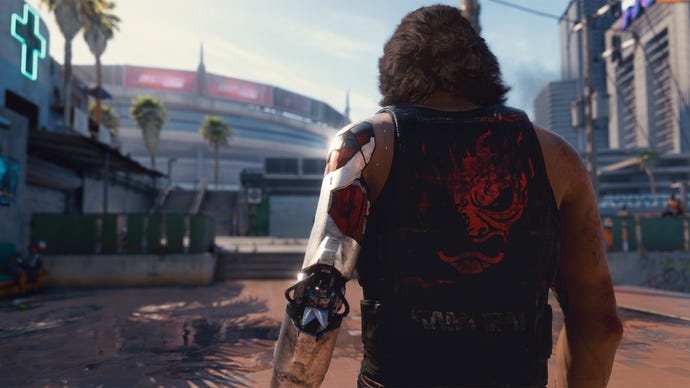Cyberpunk 2077 Quest Director on The Witcher 3 Comparisons, Life Paths, and Keanu
At E3 2019, we sit down with the director of Cyberpunk 2077's quests to learn about how Night City, life paths, and more will affect how the story unfolds.
This article first appeared on USgamer, a partner publication of VG247. Some content, such as this article, has been migrated to VG247 for posterity after USgamer's closure - but it has not been edited or further vetted by the VG247 team.
E3 2019 is in the rearview, and once again, Cyberpunk 2077 was one of the biggest games of the show. It announced a shockingly soon release date of April 16, 2020, and let John Wick and The Matrix star Keanu Reeves waltz on stage with enthusiasm. He revealed that he would be playing Johnny Silverhand, a central character in the Cyberpunk universe. In 2077, he's still prominent too: he's a digital ghost living in a biochip in the protagonist V's head.
So basically, Keanu's the whisper in your ear. The invisible good cop to your bad cop, or vice versa. He is your conscience, but also someone to vent to. He is, shockingly, way more prominent than I expected from a big celebrity being in a video game, at least judging from the very Keanu-heavy demo we saw at this year's E3.
We watch as the demo switches between a Netrunner character build to a Solo build. The former is good at hacking, the latter at smashing-they can tear a turret from its perch, whereas a Netrunner can hack it under their control. The classes are also fluid, so you're never stuck on one path if you find yourself preferring another skillset. We also see Life Paths in action, of which there are three at the start to choose from: Street Kid, Corporate, or Nomad. Life Paths don't just denote your character's loose backstory, but also which dialogue options are available to you at certain points.
At E3 2019, we sat down with quest director Mateusz Tomaszkiewicz of CD Projekt Red following the hands-off PC-run demo that shows V (and Keanu, by extension), exploring the abandoned resort city of Pacifica on a quest for the Voodoo Boys gang. Tomaszkiewicz enlightens our greatest curiosities about the biggest differences between Cyberpunk 2077 and The Witcher 3 in terms of world and narrative design, Keanu Reeves' role in the game, and more.
USG: Night City, the setting for Cyberpunk, seems really vast. I was wondering, compared to The Witcher 3, how will Night City's own areas shake out? Is it one big world, or more separated like Velen, Skellige, White Orchard?
Mateusz Tomaszkiewicz, quest director: So Night City, there are no loading screens as you travel through it. It's fully seamless. However, in terms of the architecture and sense of the environment, the community and society is divided into main six districts which also in turn have subdistricts. On top of that we also have the Badlands, which are the area surrounding the city, like the outskirts. And we like to think about those like different biomes a little bit. So it's kind of like the different maps in The Witcher 3, where you travelled to Skellige and you had totally different visuals. We want the city to feel like this as well.
So, for example, you have Pacifica, which is the area you saw in the demo. It's inhabited solely by the Haitian community. So the people that were brought into Night City to build Pacifica, which was supposed to be this luxurious retreat for the employees from the corporations who would spend money there, to come back to the corporations in this cycle, right? However, the plug was pulled at some point on the project and the financing was off, and all of these people ended up without jobs in a city that actually doesn't want them there. So they decided to just take matters in their own hands and occupy Pacifica; they kind of squat there.
Then you have, for example, the downtown where the corporations have strict order and is governed by corporate security and the police, and so on. And it's totally different feeling than Pacifica. So we have six of those that, like I mentioned; we have the Badlands which are its entire biome in itself, like it's this wasteland outside of the city. You know, like this is how we imagined that a lot of space in between the states looks like, and it's mostly inhabited by Nomads who travel from state to state. Most people from the big cities, they do not travel outside of the cities because there are many legends regarding the brutality of the Nomads. Which, of course, to a large degree are not true. They are just people who are living there and trying to make the life. So I think these are like the closest to compare to The Witcher, say, in terms of the variety of the environment.
During the demo I was a little alarmed by the names of two of the gangs: the Animals and Voodoo Boys. I was wondering if you could go into deeper context behind those particular names?
Yes, of course. So in general we would like to show that in this world, humans in our societies have prejudices and they also do not treat everyone equally. So the Voodoo Boys, for example, the name comes not from the people themselves. That's not how they would call themselves, but that's how people from the city treat those people. So they are extremely prejudiced towards, and because they are from Haiti, where Voodoo is like an actual religion, this is the label that they gave them. So through that we want to show that the city oppresses them and the city doesn't accept them.
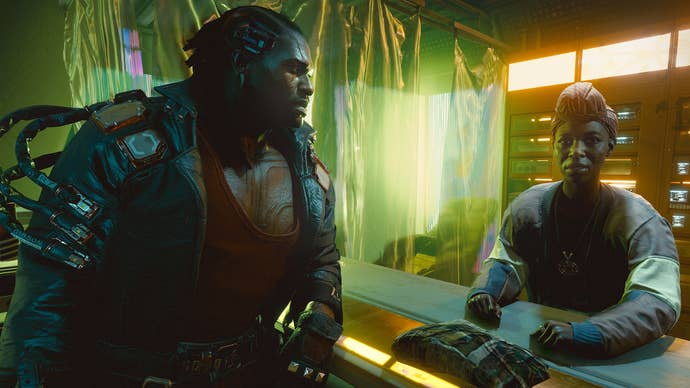
However, as you progress through the story, as you saw in this quest, you see that actually they are not at all stereotypical, like I don't know witch doctors or anything like that. They are actually very highly skilled netrunners, like some of the best in the city, and they have nothing really in common with the prejudice that is built around them. A similar thing you could say about the Animals, like the name that stuck to them, is related to the fact that they are usually working as bodyguards around the city. So a lot of them are buff and well-built. And this is a nickname, like a moniker, that stuck with this gang as well. So in general, yes our view is that we would like to portray the oppressiveness of the system and how these people think in Night City about different people and how they treat each other. It's reflected of that.
On another note, Keanu Reeves was revealed to be in this game during Microsoft's conference. And judging from the demo, he seems to be very prominent in it too. How did he get involved in the project, and at such a great capacity?
So around a year ago we were thinking about what kind of character Johnny is and, you know, he's such an important character; we wanted to get it right. Johnny, in a nutshell, is a rebel. He's a person who stands for something, and in this case he stands against this corporate system, against this oppression, and against this inhumane treatment of the people in society. And Keanu Reeves has a long history of playing characters that are exactly this: characters that stand up for something, and that fight for their ideals. So we felt like it's a natural fit for Johnny. And again, because it's such an important character, we felt like such an experienced actor as Keanu would be a good fit, and I think it works pretty well.
Now I know that he's revealed in the demo we saw today to basically be a digital ghost, but at last E3, there was a hook up system that was detailed in interviews and other news. I was wondering, can you hook up with Keanu?
Well, the relationship between V and Keanu is a complicated one. As we mentioned in the demo, Johnny is basically seen in the game as this digital construct of a personality, right? Johnny himself, he's a character from the original 2020. And if someone followed the original stories, there was the story of Firestorm where Johnny apparently died. So it's kind of a mystery of what actually happened with him. And in our game here, he emerges as this personality construct which with whom you interact throughout the game. And these and Johnny's relationship changes as the story goes on. But of course I would rather not spoil too much.
You mentioned that Johnny is a character from the original Cyberpunk tabletop game. So what other nods to the original game will there be in 2077?
As we were working on this project, we were working in close cooperation with Mike Pondsmith and his team, the authors of the original setting of the 2020. We wanted to keep continuity of characters, events, and so on, so we don't contradict each other. Especially since Mike and his team are working on Cyberpunk Red, which takes place a little bit later than 2020 but still earlier than 2077.
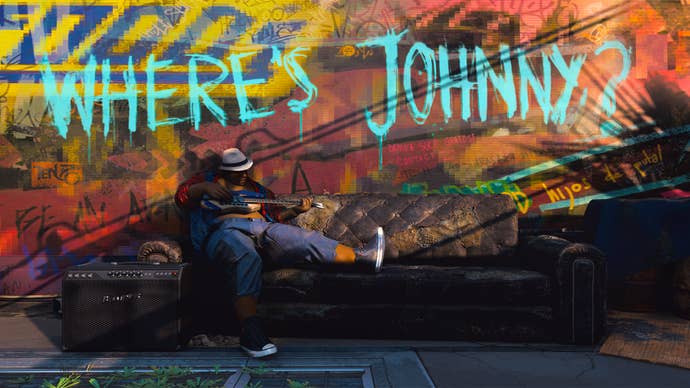
So we have multiple nods throughout the whole game to the short stories from the guidebooks. Some other characters from the original guidebooks are still present. Of course, a number of corporations that were described in general sourcebooks are still present. So, I think people who know the original setting, they will find a lot of cool nods to the knowledge they might have. But at the same time, I think the game stands well on its own.
And something I was wondering in the demo is there are these long sequences of walking and talking with characters. With how fluid the narrative and quest design is, is it possible to kill those main characters and change the narrative in that way?
The way it works is that for the main storyline there is a number of characters, the story, key characters that you actually cannot harm unless you make a specific narrative choice to do so. In the side quests, we give the players a little bit more liberty with this because side quests you can fail. So there is a number of characters that can be killed. There is a limited amount of characters that cannot be harmed. Same goes for children.
I was surprised to see the release date is so soon. I was kind of anticipating this would be a cross-gen thing. So, are there any plans for this to be cross-gen with the new Xbox and PlayStation coming out in the near future?
I mean at this moment we are focusing on the three platforms we announced. So PC, Xbox One, and PlayStation 4. Aside of that, you know, I can't really comment further.
So earlier this week there was a controversy about a trans model poster that appeared in the game, and here during an interview with Polygon, CDPR responded to it. It's not the first controversy for your studio though. I've seen a lot of people online express how they can't really trust CD Projekt Red to handle this kind of representation with respect based on its past missteps. How does that feel, and what is the company doing to try and earn that trust back?
I know for sure that we had many discussions about this in the office, and there are a lot of people at the office that really care about these subjects and we want to do it right. And, you know, it's sad to hear sometimes that people associate these negative assumptions regarding us, or like assign like malign intent to us, because that's not the case, I can assure you. And yes, like we are talking a lot about the subject and in general things like the poster, they're like we discussed with the Voodoo Boys for example, they are mostly there to portray our interpretation of how this world is oppressive and how bad it is actually for the people that live in this world. To show that, and it's not like in any form a way of condoning this kind of behavior or this kind of portrayal, it's more like ways of showing that the corporations are actually unethical in how they sexualize everything and how they treat people.
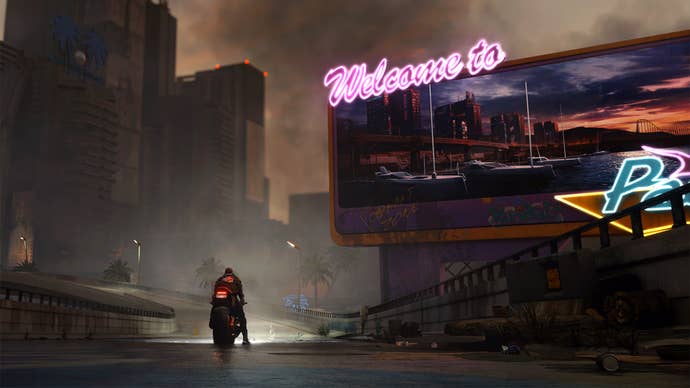
The running thread through Cyberpunk 2077 sounds very anti-capitalist. What are some other themes in it?
The world of Cyberpunk is this of like limitless consumptionism, focusing on profits in terms of the corporations, of decline of civilization really, they are not following any kind of ethical codes. They are able to actually push any kind of legislation through the puppet governments and so on, and this is just one side of it.
Another one of those is like transgression. So like crossing boundaries that they actually shouldn't be crossing; also it's tied into the previous theme, because they are able to do so because they are so powerful. And transgression is shown for example through a plotline of Johnny in a biochip, and so on. So for example the fact that the corporations are pushing products that can replace virtually anything in your body. You don't really think about the consequences for the society because they're mostly focused on the profit.
These, like social inequalities, for sure too. Again, that's shown at this demo for example, through the Voodoo Boys and to how society of Night City and the system of Night City treated them as this worker class, and now that they're no longer needed, they're tossed aside. We are trying to be thought provoking in terms of the themes we are touching upon and I hope that's how people will interact with the game.
Tell me about the Life Paths in particular, which seem pretty distinct both in history and the dialogue options that unlock with each.
It's quite interesting because, like you said, they are so distinct. So you have the Street Kid, who's a person who lived on the streets who knows all about shady dealings of the gangs. And then you have Nomads, who like I mentioned before, you have traveling between the states. They are really shunned by society, but they are actually more free than people in the city. And then you have the Corporate person who tried to climb the corporate ladder and play by their rules, but in the end left the corporation, became a merc.
So each of those come with different variety of advantages and disadvantages. So, for example, you might imagine that when you have some missions that involve corporations more heavily, you know their know how, you know how they think, and you know how to use it to your advantage in the dialogue. And at the same time, as a Corporate you're not really liked on the streets, or you might not know how the street really works. That's where the Street Kid has an advantage when you interact with the gangs and so on. And the Nomad, of course, has more advantages when directing the Nomad societies, Badlands, and so on.
I think each of them will provide a different kind of flavor and different experience for the players as they play through the quests and through the narrative. But I wouldn't say we cut off any kind of content due to this. You shouldn't feel like losing anything based on this. However, it does enhance, in my opinion, this role playing experience. You feel more in the character, I feel, if you have these kinds of elements; and also it helps with the replayability of the game, because in order to fully experience all the paths, you will have to play at least three times.
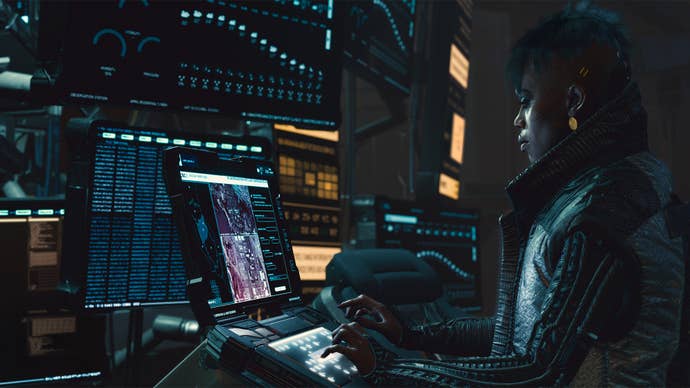
So will there be multiple endings?
Yes. We are planning multiple endings. I would not disclose how many. But yes.
The Witcher 3 is coming to Switch now, which is pretty exciting. Did you do any work on that port at all?
No, not personally. We're doing this in cooperation with Saber Interactive, and they were the crew that was mostly doing this. The only extent to which I was involved was giving feedback and playing the game. I was a lead quest designer on Witcher 3, so I was one of the people that were let in on very early versions of it. So I was able to actually play it on Switch at my home, and it was really cool.
I was really surprised that they managed to get this level of quality on Switch. I mean, I have a Switch myself, and I love this console. It's so convenient and so nice to play games on it. I think it's a great thing and I really enjoyed playing our game on it as well, especially, you know, a few years after release. Like I didn't see it in a while. Rough memories.
On that subject, what has the work life been like since Witcher 3? Crunch was an epidemic at CD Projekt Red according to reports, with CDPR's bosses even telling Kotaku recently that it's pledging to have a healthier work environment now. From your perspective, how has working at CD Projekt Red changed during the development of Cyberpunk?
Well, I would say each project has its ups and downs and its own set of challenges, and Cyberpunk is no different in this regard. It has a different set of challenges, of course, because it's such a vastly different project. So, for example, like I mentioned for Cyberpunk, we have set this challenge ahead of ourselves with the introduction of these gameplay and nonlinearities. And the biggest difficulty with this was like, we've never done anything like this before. So we had to restructure the team a little bit to make it work. Now I think we have actually quite a good pipeline for it, and the message that was sent through this article by Adam [Badowski, director of Cyberpunk] and by Marcin [Iwi?ski, co-founder of CD Projekt] I think is a very positive one. Most people in the studio really felt uplifted by it.
